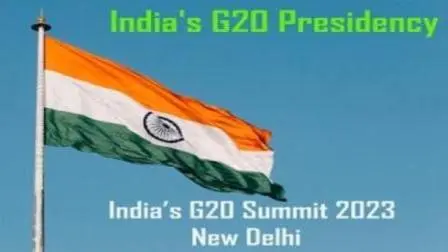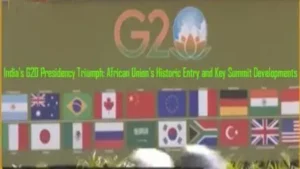Introduction:
Amid deep divisions over the Russia-Ukraine war, Prime Minister Narendra Modi urged world leaders at the G20 Leaders’ Summit to bridge the global trust deficit and find innovative solutions to longstanding challenges. In his opening remarks, PM Modi expressed confidence that just as the world overcame the challenges of the Covid-19 pandemic, it could also prevail over the trust deficit caused by the ongoing conflicts. This blog delves into the top 10 developments at the G20 Summit, with a focus on India’s significant diplomatic accomplishments during its G20 presidency.
1. India’s G20 Presidency Welcomes the African Union in Historic Move:
India’s G20 presidency achieved a momentous milestone by facilitating the inclusion of the African Union as a permanent member of this influential consortium. This landmark decision marked the first expansion of the G20 since its inception in 1999. Beyond symbolism, the African Union’s inclusion has profound implications for the global geopolitical landscape and the overall G20 presidency.
The inclusion of the African Union as a permanent member is not merely symbolic; it carries far-reaching implications. Prime Minister Modi aptly noted that this move serves to bolster not only the G20 but also amplify the voice of the Global South during its G20 presidency. It signifies a significant stride towards addressing global challenges with perspectives and insights from a broader spectrum of nations.
This development signifies India’s commitment to fostering stronger ties with African nations, recognizing their growing influence and contributions to global affairs. India’s historical connections with Africa and its focus on South-South cooperation align perfectly with this inclusion.
2. Empowering the Global South’s Influence during India’s G20 Presidency:
The inclusion of the African Union as a permanent member is not just a symbolic gesture; it signifies the empowerment of the Global South within the G20. The Global South, comprising nations from Africa, Latin America, Asia, and Oceania, has historically faced challenges related to representation and influence in international forums.
India’s emphasis on amplifying the Global South’s voice within the G20 is grounded in principles of equity and justice. It recognizes that a more equitable global order requires active engagement with nations from the Global South, who bring unique perspectives and experiences to the table.
This move is expected to lead to more inclusive and balanced discussions within the G20, with a wider range of perspectives considered when addressing global issues. It also reflects India’s commitment to serving as a bridge between the Global North and the Global South.
3. India’s Prominence in Global Economy during Its G20 Presidency:
Prior to the G20 Summit, India’s economic prowess took center stage as the stock market scaled unprecedented heights, achieving a valuation of $3.8 trillion. This remarkable feat underscores India’s economic resilience and growing prominence on the global economic landscape. It also positions India as a significant player in international economic affairs.
Several factors have contributed to India’s economic success. Robust domestic growth prospects, ongoing policy reforms, and a trajectory of strong credit growth have played pivotal roles. Furthermore, the shift towards a multi-polar world has presented new opportunities, with India poised to reap the benefits of this evolving global order.
India’s economic resurgence is not only significant for the country but also for the broader global economy. As a major consumer market and a hub for technological innovation, India’s economic growth has positive ripple effects worldwide.
4. India’s G20 Presidency: Unpacking the Factors Behind Economic Success:
India’s remarkable economic resurgence can be attributed to several key factors. First, its commitment to economic reforms and liberalization has created a favorable business environment. The “Make in India” initiative and other policy measures have attracted foreign investment and encouraged domestic manufacturing.
Second, India’s youthful and dynamic workforce has been a driving force behind its economic growth. The country’s demographic dividend is a source of competitive advantage, especially in sectors like technology and services.
Third, India’s focus on digitalization and innovation has positioned it as a leader in the technology sector. Initiatives like “Digital India” have expanded digital infrastructure and access, paving the way for a digital economy.
Lastly, India’s engagement with the global economy through trade agreements and partnerships has enhanced its economic prospects. The nation’s strategic location and extensive trade networks contribute to its economic significance on the world stage.
5. India’s Diplomatic Engagement on the Ukraine Conflict:
At the G20 Summit, India displayed proactive diplomatic leadership by circulating a new paragraph among G20 countries. This paragraph aimed to describe the Ukraine conflict in the joint leaders’ declaration. India’s commitment to finding diplomatic solutions to global crises was on full display, emphasizing the nation’s role as a responsible global actor.
Also read: UPI ATM: Withdraw Money Without a Debit Card – Your Guide
India’s diplomatic efforts regarding the Ukraine conflict reflect its long-standing policy of non-alignment and constructive engagement. India has a history of promoting peaceful coexistence and conflict resolution, and its diplomatic efforts at the G20 Summit align with these principles.
The inclusion of the Ukraine conflict in the G20 discussions during India’s G20 presidency signifies the forum’s role as a platform for addressing pressing global issues. It underscores the importance of diplomatic dialogue and cooperation in resolving conflicts and promoting international peace and security.
6. India’s People-Centric G20 Presidency:
India’s G20 presidency has not only been about diplomatic achievements but has also transformed into a platform for people from diverse backgrounds to engage in dialogue and collaboration on pressing global issues. The emphasis on promoting inclusivity both within and beyond its borders was a hallmark of India’s presidency.
India’s G20 presidency was marked by a commitment to inclusivity at multiple levels. Domestically, it sought to engage a wide range of stakeholders, including civil society organizations, businesses, academia, and youth. This approach aimed to ensure that diverse perspectives and voices were heard in the G20 deliberations during India’s G20 presidency.
The organization of over 200 events in more than 60 cities across India demonstrated a concerted effort to involve people from various regions and backgrounds during India’s G20 presidency. These events covered a wide array of topics, including climate change, sustainable development, trade, and innovation. They provided a platform for dialogue and collaboration, fostering a sense of ownership and participation among the Indian population during India’s G20 presidency.
Inclusivity was not limited to domestic efforts alone during India’s G20 presidency. India’s G20 presidency also emphasized the importance of listening to the concerns and perspectives of the Global South. It recognized that a more equitable global order required active engagement with nations from Africa, Latin America, Asia, and Oceania during India’s G20 presidency.
The G20’s focus on inclusivity resonated with the principles of democracy and pluralism during India’s G20 presidency. It recognized that addressing global challenges required the collective wisdom and contributions of diverse nations and societies during India’s G20 presidency. By championing inclusivity, India’s G20 presidency set a positive example for future international gatherings, emphasizing the importance of representing a wide spectrum of voices.
7. Seeking Tangible Solutions to Global Challenges:
Prime Minister Modi stressed the importance of finding practical and actionable solutions to a wide range of global challenges during India’s G20 presidency. These challenges spanned from the upheaval in the global economy to North-South disparities, food and fuel management, terrorism, cyber security, health, and energy and water security during India’s G20 presidency. The G20, boasting substantial economic and demographic representation, stands as a potent force to collectively address these pressing issues.
The G20’s agenda is characterized by its breadth and complexity during India’s G20 presidency. It encompasses a wide spectrum of global challenges, each with its unique set of complexities and implications. Addressing these challenges necessitates a concerted effort from G20 member states to formulate practical solutions and action plans during India’s G20 presidency.
One of the key challenges highlighted during India’s G20 presidency is the ongoing upheaval in the global economy. The Covid-19 pandemic exacerbated economic uncertainties, prompting the need for coordinated strategies to ensure a stable and inclusive recovery. G20 countries, with their substantial economic clout, are well-positioned to lead efforts in this regard during India’s G20 presidency.
North-South disparities represent another critical challenge that demands attention during India’s G20 presidency. Global inequalities in access to resources, opportunities, and basic services continue to persist, hindering progress towards sustainable development goals. India’s G20 presidency emphasized the importance of addressing these disparities and promoting equitable development on a global scale.
Also read: Financial Management | Securing Your Family’s Future
Food and fuel management emerged as pressing concerns during India’s G20 presidency, reflecting the interconnectedness of these issues with global security and stability. Ensuring reliable access to food and energy resources is essential for the well-being of nations and their populations. G20 countries recognized their shared responsibility in addressing these challenges during India’s G20 presidency.
Terrorism and cyber security were subjects of paramount importance during India’s G20 presidency. The evolving nature of security threats in the digital age necessitated collaborative efforts to enhance global security frameworks. G20 member states acknowledged the need for robust cybersecurity measures and intelligence-sharing mechanisms during India’s G20 presidency.
Health, especially in the context of the ongoing Covid-19 pandemic, remained a central focus during India’s G20 presidency. G20 nations recognized the imperative of equitable access to vaccines, diagnostics, and treatments. Additionally, discussions revolved around bolstering global health infrastructure and preparedness to mitigate future pandemics effectively during India’s G20 presidency.
Energy and water security were prominent themes during India’s G20 presidency, considering their critical role in sustainable development and climate resilience. G20 countries explored strategies to enhance energy efficiency, promote renewable energy sources, and ensure responsible water management practices during India’s G20 presidency.
Prime Minister Modi’s call for concrete solutions to these global challenges underscored the G20’s role as a platform for collaborative action. G20 member states, collectively representing a significant portion of the world’s population and economic output, recognized their shared responsibility in addressing these pressing issues during India’s G20 presidency.
8. The Economic Significance of the G20:
The economic significance of the G20 is paramount. Collectively, the G20 countries account for a staggering 85 percent of the world’s economic output and an impressive 75 percent of global trade. This economic clout translates into immense influence in shaping the global economic and political landscape.
The G20 serves as a forum where member states discuss economic policies, trade agreements, and financial regulations. Its decisions have far-reaching implications for global economic stability and growth. During India’s G20 presidency, the economic dimension of the forum came into sharp focus.
One of the key roles of the G20 is to facilitate international cooperation on economic matters. This was particularly evident during the Covid-19 pandemic when G20 nations coordinated their responses to mitigate the economic fallout. The G20’s commitment to free and open trade, coupled with efforts to reform international financial institutions, has a profound impact on global economic governance.
The G20 also plays a crucial role in addressing global economic challenges such as fiscal and monetary policy coordination, sustainable development, and financial stability. These issues are central to ensuring a prosperous and equitable global economy. India’s G20 presidency underscored the forum’s commitment to addressing these challenges through dialogue and cooperation.
In the context of India’s G20 presidency, the forum’s economic significance extended beyond traditional economic matters. It became a platform for discussing strategies to promote inclusive and sustainable growth. This reflects the G20’s recognition that economic progress must go hand in hand with social and environmental considerations.
9. Amplifying the Global South’s Voice:
Prime Minister Modi consistently underscored the importance of the G20 heeding the concerns and perspectives of the Global South during India’s G20 presidency. This unwavering commitment reflects India’s dedication to ensuring a fair and equitable global order where the voices of all nations, regardless of their economic size, are heard and respected.
The Global South, comprising nations from Africa, Latin America, Asia, and Oceania, has historically faced challenges related to representation and influence in international forums. These nations, despite their significant contributions to global development, often find themselves marginalized in global decision-making processes.
India’s emphasis on amplifying the Global South’s voice within the G20 is grounded in principles of equity and justice. It recognizes that a more equitable global order requires active engagement with nations from the Global South, who bring unique perspectives and experiences to the table.
Also read: Living in Deeds, Not Years: A Guiding Proverb for a Meaningful Life
One of the key areas where the Global South’s voice is crucial is in discussions related to development and poverty reduction. Many countries in the Global South continue to grapple with issues of poverty, inequality, and access to basic services. Their perspectives are essential in shaping international policies aimed at addressing these challenges.
Additionally, the Global South plays a pivotal role in issues related to sustainable development and climate change. These nations often bear the brunt of environmental challenges and are essential partners in global efforts to combat climate change and promote environmental sustainability.
India’s commitment to amplifying the Global South’s voice aligns with its role as a bridge-builder on the global stage. India has a history of facilitating dialogues and negotiations in various international conflicts, drawing on its diplomatic expertise and commitment to peaceful coexistence.
By advocating for the Global South within the G20, India contributes to the forum’s mission of fostering a more inclusive and equitable global order. It underscores the importance of respecting the principles of sovereign equality and non-interference in the internal affairs of nations, core tenets of international relations.
10. A Platform for Global Population Representation:
The G20’s significance extends beyond economic might; it also serves as a platform representing two-thirds of the world’s population. Prime Minister Modi has continually stressed that the group should not only prioritize economic discussions but also listen to the concerns and aspirations of the Global South. This emphasis on inclusivity highlights the need for a more comprehensive and equitable global discourse.
The G20’s demographic representation is a critical aspect of its role in global governance. It brings together nations that collectively account for a significant portion of the world’s population, encompassing diverse cultures, languages, and perspectives.
The inclusion of population representation in the G20’s agenda underscores the recognition that global challenges, from public health crises to climate change, have direct and indirect impacts on people’s lives. It acknowledges that policies and decisions made at the international level affect billions of individuals.
Prime Minister Modi’s call for prioritizing the concerns and aspirations of the Global South within the G20 is in line with the principles of democratic governance. It emphasizes the importance of a more inclusive and equitable global discourse where the voices of all nations and their citizens are acknowledged and respected.
The G20’s demographic diversity enriches its discussions and deliberations. It allows for a broader range of perspectives and solutions to be considered when addressing complex global issues. It recognizes that solutions must be tailored to the specific needs and circumstances of different regions and communities.
Furthermore, the G20’s demographic representation underscores the interconnectedness of the world. It highlights that challenges and opportunities are shared across borders and that global cooperation is essential in addressing them effectively.
Conclusion:
In conclusion, India’s G20 presidency marked significant achievements, notably the inclusion of the African Union as a permanent member. In a world grappling with trust deficits due to ongoing conflicts, the G20 Summit provided a platform for global leaders to unite, seek common solutions, and promote global well-being.
India’s economic resurgence, diplomatic initiatives, and commitment to inclusivity underscore its growing influence on the global stage. The G20, as a forum representing the world’s largest economies, holds the potential to drive positive change and foster international cooperation in a rapidly evolving global landscape.
Its role in amplifying the voices of the Global South and acknowledging the importance of population representation emphasizes the need for a more inclusive and equitable global discourse. As the G20 continues to shape global governance, its commitment to inclusivity and representation will be pivotal in addressing the world’s most pressing challenges.
In a world where trust and cooperation are paramount, the G20 serves as a beacon of hope, reminding us that by working together, nations can overcome challenges and build a brighter future for all. India’s G20 presidency exemplified this spirit of collaboration and unity, offering a vision of a more inclusive and equitable world.









